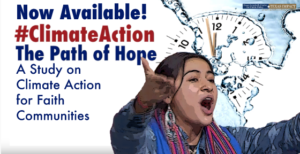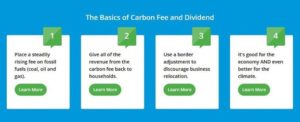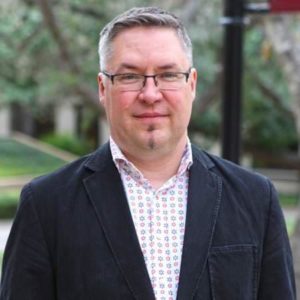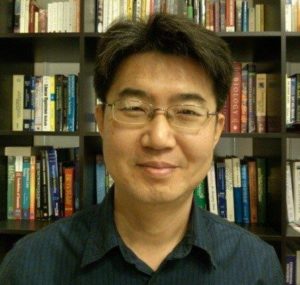Calendar
Christ the King Evangelical Lutheran Church in Houston invites you to a monthly environmental education web meeting series whose theme in 2022 is Planet Earth & You. In February, join Jim Blackburn, Professor in the Practice in Environmental Law at Rice University, who will discuss his new book, Earth Church, which he co-authored with artist Isabelle Scurry Chapman. Earth Church is a book about Earth-based spirituality, a subject that will become much more prominent in a future defined by a changing climate and the creation of a new economic system that is circular rather than linear. At the center of Earth-based spirituality is the Earth itself, that wonderful planet without which we would not be. Blackburn will weave a narrative around the poetry and art of Earth-based spirituality. Time for interactive Q&A with the speaker will be provided.

The Interfaith Environmental Network of Houston invites you to celebrate Earth Day/Month by joining our team for the online Earth Month EcoChallenge. This EcoChallenge focuses on the sustainable development goals of the United Nations, with categories of: basic needs & security, health & equity, education & livelihood, economy & communities and climate & ecosystems. You pick your challenges to complete during the month – to build a new sustainable habit, learn about an environmental issue, advocate for eco-justice, volunteer or spend more time in nature (among the many, many choices). Join the Interfaith Environmental Network of Houston team & we’ll support each other along the journey. To sign up or to learn more, go to https://earthmonth.ecochallenge.org/. Questions? – Contact Lisa Brenskelle at gcs.lrc@gmail.com.

You are invited to join an online discussion series built around 15-minute videos featuring interviews with US faith leaders, representatives of climate-impacted communities from the global South, and presentations by UN officials and other experts. The videos walk viewers through four key climate policy issues that intersect with universal faith concerns for vulnerable and marginalized people. The series focuses on how climate change is impacting the core ministries of faith communities around the world, how those impacts will increase in the future, and why these impacts create an imperative for people of faith to advocate for strong US climate action.  A discussion guide is included that asks participants to think deeply about how their own local faith community’s direct service programs intersect with climate impacts, and how knowledge and experiences gained through these programs might help to inform climate policy. The study’s Action Center provides practical, step-by-step instructions for advocacy activities, as well as recommended policy asks for local, state, and national leaders.  Join us! Please register on www.eventbrite.com at https://www.eventbrite.com/e/the-path-of-hope-a-study-on-climate-action-for-faith-communities-tickets-273103288287. Contact Lisa Brenskelle at gcs.lrc@gmail.com for more information.

You are invited to join an online discussion series built around 15-minute videos featuring interviews with US faith leaders, representatives of climate-impacted communities from the global South, and presentations by UN officials and other experts. The videos walk viewers through four key climate policy issues that intersect with universal faith concerns for vulnerable and marginalized people. The series focuses on how climate change is impacting the core ministries of faith communities around the world, how those impacts will increase in the future, and why these impacts create an imperative for people of faith to advocate for strong US climate action.  A discussion guide is included that asks participants to think deeply about how their own local faith community’s direct service programs intersect with climate impacts, and how knowledge and experiences gained through these programs might help to inform climate policy. The study’s Action Center provides practical, step-by-step instructions for advocacy activities, as well as recommended policy asks for local, state, and national leaders.  Join us! Please register on www.eventbrite.com at https://www.eventbrite.com/e/the-path-of-hope-a-study-on-climate-action-for-faith-communities-tickets-273103288287. Contact Lisa Brenskelle at gcs.lrc@gmail.com for more information.

Members of Citizen’s Climate Lobby explain the ins and outs of carbon fee & dividend as an economic policy tool to address climate change. Learn about the positive impact not only on the environment, but also on jobs, the economy, and human health.  And, carbon fee & dividend has been deemed by economists as the fastest way to reduce greenhouse gas emissions of any economic policy approach. But, best of all, carbon fee & dividend is designed to ensure equity and justice, a key concern of people of all faith/spiritual traditions. Please register for this event on www.eventbrite.com at: https://www.eventbrite.com/e/carbon-fee-dividend-whats-justice-got-to-do-with-it-tickets-307725203367. Contact Lisa Brenskelle at gcs.lrc@gmail.com for more details.

You are invited to join an online discussion series built around 15-minute videos featuring interviews with US faith leaders, representatives of climate-impacted communities from the global South, and presentations by UN officials and other experts. The videos walk viewers through four key climate policy issues that intersect with universal faith concerns for vulnerable and marginalized people. The series focuses on how climate change is impacting the core ministries of faith communities around the world, how those impacts will increase in the future, and why these impacts create an imperative for people of faith to advocate for strong US climate action.  A discussion guide is included that asks participants to think deeply about how their own local faith community’s direct service programs intersect with climate impacts, and how knowledge and experiences gained through these programs might help to inform climate policy. The study’s Action Center provides practical, step-by-step instructions for advocacy activities, as well as recommended policy asks for local, state, and national leaders.  Join us! Please register on www.eventbrite.com at https://www.eventbrite.com/e/the-path-of-hope-a-study-on-climate-action-for-faith-communities-tickets-273103288287. Contact Lisa Brenskelle at gcs.lrc@gmail.com for more information.

You are invited to join an online discussion series built around 15-minute videos featuring interviews with US faith leaders, representatives of climate-impacted communities from the global South, and presentations by UN officials and other experts. The videos walk viewers through four key climate policy issues that intersect with universal faith concerns for vulnerable and marginalized people. The series focuses on how climate change is impacting the core ministries of faith communities around the world, how those impacts will increase in the future, and why these impacts create an imperative for people of faith to advocate for strong US climate action.  A discussion guide is included that asks participants to think deeply about how their own local faith community’s direct service programs intersect with climate impacts, and how knowledge and experiences gained through these programs might help to inform climate policy. The study’s Action Center provides practical, step-by-step instructions for advocacy activities, as well as recommended policy asks for local, state, and national leaders.  Join us! Please register on www.eventbrite.com at https://www.eventbrite.com/e/the-path-of-hope-a-study-on-climate-action-for-faith-communities-tickets-273103288287. Contact Lisa Brenskelle at gcs.lrc@gmail.com for more information.

Groundwater is, as famously quoted by the Texas Supreme Court in 1904, “secret, occult, and concealed.†Sometimes referred to as “hidden water,†it is out of sight and, therefore, unfortunately, out of mind. However, groundwater comprises 98.7 percent of all the fresh, unfrozen water on Earth. About 40 percent of all surface-water flows in the United States are sourced from innumerable seeps and springs that discharge groundwater into streams and rivers. Groundwater supports 26 percent of the human use of water with 70 percent of it watering crops. As drier areas become drier and droughts increase everywhere, groundwater is expected to make up the difference. Unfortunately, much of the groundwater used across the planet is produced unsustainably. This unsustainable use affects flows to springs, streams, rivers, wetlands, and estuaries that support ecologies as well as human needs. In some cases, such as in the Houston area, groundwater production has caused the land to sink, increasing flooding. In this presentation, Professor Mace will present what he has learned about groundwater sustainability through a report he published late last year title “Five Gallons in a Ten-Gallon Hat: Groundwater Sustainability in Texas†and in a forthcoming book titled “Groundwater Sustainability: Its Birth, Development, and Application.†Listeners will have a better understanding of what groundwater sustainability is, how Texas and the greater Houston area is doing with sustainable groundwater management, and what people can do to achieve groundwater sustainability. Time for interactive discussion with the speaker will be provided. Please register for this talk on www.eventbrite.com at https://www.eventbrite.com/e/how-long-will-our-aquifers-last-tickets-314757356727. Contact Lisa Brenskelle at gcs.lrc@gmail.com with any questions.

Join Professor Robert Mace of Texas State University for a discussion on freshwater scarcity. Growing populations, the ever-present threat of drought, aquifer over-pumping, reservoir sedimentation, and climate change are creating a perfect storm to challenge the resiliency of our water supplies. Since water is needed for human health, agriculture, industry, energy, recreation, and the environment and it takes decades to develop new water supplies, it’s critical for societies to carefully plan for today’s and tomorrow’s water. We all play a role here, whether through giving decisionmakers courage to plan for the future, supporting the development of new water supplies, and using water as efficiently as possible in our daily lives. Time for interactive discussion will be provided after his talk. Register for this talk on www.eventbrite.com. All registrants will receive a recording of the talk afterward. Contact Lisa Brenskelle at gcs.lrc@gmail.com for more information.

Join Professor Hyun-Min Hwang of Texas Southern University as he examines the issue of plastic pollution.   Plastic is a polymeric material, not biodegradable, and may last hundreds of years in the environment. Substantial fractions of plastic waste are disposed of improperly, and are found everywhere, even in the middle of the ocean and deep-sea floor.  Small plastics, known as microplastics, accumulate inside of animal bodies and pass through food chains. Some plastics contain harmful chemicals added intentionally during manufacturing processes. These chemicals leached from plastics can cause toxic impacts on humans and wildlife. Plastic production is fast-increasing, so the amount of plastic waste in the environment will also continuously increase unless we change the way we live with plastics. There are easy-to-follow practices we can apply to everyday life to help protect, preserve, and sustain natural resources. The future is up to us. Join Professor Hwang to consider how we can make the earth a better place to live for ourselves, future generations, and wildlife as well. Time for interactive discussion will be provided after his talk. Register for this talk on www.eventbrite.com. All registrants will receive a recording of the talk afterward. Contact Lisa Brenskelle at gcs.lrc@gmail.com for more information.
